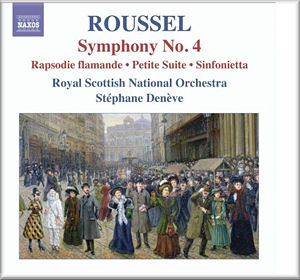 |
 |
|


alternatively
CD: AmazonUK
AmazonUS
Download: Classicsonline
|
Albert ROUSSEL
(1869-1937)
Symphony No. 4 in A major, Op. 53 (1934) [23:18]
Rapsodie flammande, Op. 56 (1936) [9:58]
Petite Suite, Op. 39 (1929) [13:00]
Concert pour petit orchestre, Op. 34 (1927) [13:12]
Sinfonietta, Op. 52 (1934) [9:40]
 Royal Scottish National Orchestra/Stéphane Denève
Royal Scottish National Orchestra/Stéphane Denève
rec. Henry Wood Hall, Glasgow, UK, 17-18 October 2006 (Rapsodie);
30 May-1 June 2007 (Sinfonietta); 13-14 August 2008 (Symphony, Petite
Suite); Henry Wood Hall, 14 August 2008 and City Halls, Glasgow,
20-21 October 2008 (Concert pour petit orchestre) DDD
 NAXOS 8.572135 [69:08]
NAXOS 8.572135 [69:08] 
|
|
|
This CD may conclude Stéphane Denève’s highly
regarded series of Roussel’s symphonies and other orchestral
works, unless he plans to record The Spider’s Feast
and other music not already represented. Of the four volumes,
the one under review may well be the most attractive because
all of the works come from Roussel’s mature period where
he had perfected his own brand of neo-classicism. In Richard
Whitehouse’s words in the accompanying booklet, Roussel’s
neo-classicism is “wholly personal in its resourceful
harmonies, intricate counterpoint, and energetic rhythms.”
Indeed, a few minutes spent with any of the works on the disc
will reveal the composer’s individual stamp, easily identifying
the music as that of Roussel.
The Fourth Symphony has never been as popular as its famous
predecessor, but certainly deserves to be. If anything, it has
greater depth and more variety in its four movements and, arguably,
the most profound slow movement Roussel composed. It may not
have the powerful, motoric rhythms of the Third, but compensates
with its greater lyricism. It has received its share of excellent
recordings, too, but none better than this new one by the RSNO
under Denève. His has been a superb series all round
and no more so than in the current release. I have not heard
the series by Christoph Eschenbach and the Orchestre de Paris,
which has also received a good deal of attention, but I doubt
that it could be better than this one. Heretofore my favorite
recording of the Fourth Symphony has been the one by the Detroit
Symphony under Neeme Järvi on a Chandos CD that also includes
the second suite from Bacchus et Ariane, the Sinfonietta,
and the Third Symphony. While that version of the Fourth is
quite good, with excellent performance and sound, Järvi
does not bring out the variety in the work the way Denève
does. For one thing he races through the slow movement: his
timing is 7:04 compared to 9:36 for Denève! This is more
than a subtle difference, with Denève finding much more
in it without ever sounding the least bit ponderous. Elsewhere,
too, one is much more aware of the wonderful orchestration with
the many wind solos making their presence felt, but with no
distortion in the balance with the strings and percussion. Having
listened to this new version numerous times, I cannot imagine
a better performance of one of the twentieth-century’s
most delightful symphonies.
The remainder of the disc is also up to the level of the symphony,
with none of the works being mere fillers. The most familiar
of these is undoubtedly the Sinfonietta, composed just before
the symphony and resembling its style, though it is scored for
strings only. Again it receives a superb performance here, as
it did with Järvi, with little to choose between the two
recordings. The other pieces on the disc are new to me, but
I enjoyed them all. As Whitehouse notes, the Flemish Rhapsody
is Roussel’s homage to his Flemish ancestry. It is based
on actual Flemish songs of the sixteenth and seventeenth centuries
and is an attractive work. The Petite Suite and the Concert
pour petit orchestre are both in three movements, as is
the Sinfonietta. The structure is similar, with a slow
movement surrounded by two faster ones. However, as in the Symphony
No. 4, the slow movements are the meatiest of the three in these
two works, being nearly as long as the two faster movements
put together. In the Sinfonietta, on the other hand,
all three movements are of similar length, even though the andante
slow movement’s three-minute length belies its power.
Both the Petite Suite and the Concert are lighter
in vein, even breezy, and contain much color and no little humor,
but are nonetheless substantial works that really add to one’s
appreciation of Roussel’s genius. The Petite Suite
is divided into an Aubade, a Pastorale, and a
Mascarade, with the Pastorale containing much
delectable writing for the woodwinds - oboe, flute, and clarinet
- and a muted trumpet solo that has a bit of blues about it.
The Concert is equally colorful and memorable and has
the character of a concerto grosso, especially apparent in the
slow movement with its woodwind solos. The first movement allegro
ends on a totally unexpected chord, after much high-spiritedness
that returns in the final presto with its driving rhythms
reminiscent of those in the Third Symphony. However, this movement,
too, ends quietly and rather unexpectedly.
There is not a dull moment in this whole program. With outstanding
performances and excellent sound, the disc will appeal strongly
to those collecting this series as well as to newcomers to Roussel’s
music. I can think of no better place to start.
Leslie Wright
see also review by Nick
Barnard
|
|


 All Nimbus reviews
All Nimbus reviews














